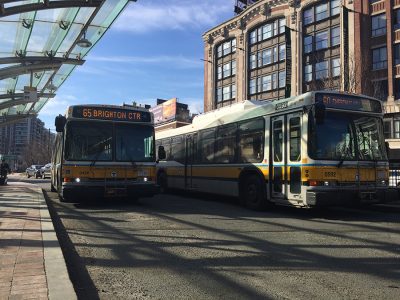
The Massachusetts Bay Transportation Authority is considering an increase in its riders’ fares as it expects to face a $111 million deficit entering the new fiscal year in July.
The amount of increase from current prices has yet to be determined, as the MBTA is in the early stages of discussing fare and budget changes for the upcoming fiscal year, Luis Ramirez, the general manager and CEO of the MBTA, said in a statement.
Although a fare increase is not outlined in the MBTA’s current budget proposal, Ramirez said, the organization would consider alternatives to shrink the deficit.
“As part of our process, we continue to look for ways to reduce the deficit,” Ramirez said in the statement. “[A] mission critical to this process is keeping expense growth rates below revenue growth rates.”
Fare increases will likely not be considered before the MBTA attempts to decrease the deficit using alternative methods, Ramirez said.
“In the coming weeks, we will present how lean productivity programs, like the recently concluded bus maintenance agreement, help close this gap,” Ramirez said in the statement. “In addition, we will review other management initiatives to find cost savings, improved efficiencies, and result, ultimately, in a better service for our customers.”
Michael Matta, 23, of Allston, said he does not think fares are currently too expensive, but believes other riders might take issue with paying higher fares.
“I honestly wouldn’t care [if the fares were raised] because I’m going to use it either way,” Matta said. “That’s the problem. It’s something I need. I don’t want to have to pay for it but I do have to, so it’s kind of a lose-lose for me and a win-win for them.”
Matta said although a fare increase would not affect his ability to ride the T, it could create difficulties for low income residents who rely on the MBTA’s low prices for convenient transportation around the city.
“It’s definitely going to make it a lot worse [for those people],” Matta said. “Some people literally won’t be able to use it because even if it’s half a dollar [increase], that’s a lot for some people — I think it’s terrible.”
MBTA’s tentative budget plan for the 2019 fiscal year lists “no fare increase; or expansion of other fare revenue initiatives” as one of its status quo budget assumptions. However, Lisa Battiston, deputy press secretary for the Massachusetts Department of Transportation, wrote in an email to The Daily Free Press that her department plans to discuss potential changes to the transportation budget at their upcoming meetings.
“The FY19 budget assumes no increases in fares or parking fees,” Battiston wrote. “At the March 5th [Fiscal and Management Control Board] meeting, there will be a discussion about potential methods for shrinking the projected deficit in the FY19 budget.”
The MBTA stated in its 2019 plan that its priorities are to provide safe and reliable services for riders and employees and invest in infrastructure, technology and accessibility.
“I feel like the fact that they are in debt isn’t surprising,” Colleen Walsh, 24, of Brighton, said. “It’s the MBTA. What do you expect?”
Walsh said she was concerned with the reliability of the MBTA system, which often leaves her waiting on her bus for 20 minutes to an hour before she reaches Kenmore station, due to the constant delays.
“I think it could be problematic for people who are already struggling to use public transportation,” Walsh said. “I think if the MBTA was more reliable, people would be more OK with the fare hike. But it’s not very reliable.”
Stacy Cruz, 26, of Dorchester, said she was “not even a little bit” surprised to hear the MBTA was considering another fare increase.
“I know they have gone up in the past multiple times and it kind of is what is,” Cruz said. “There really isn’t much of another option besides maybe taking Ubers but they’re not horrible, I guess. But in comparison to the service and the delays, sometimes it does get a little frustrating.”
Cruz said she understands that the riders’ fares contribute to necessary changes, like accommodations for riders with disabilities, but believes many riders will not tolerate higher than a four to five percent fare increase.
“If it jumped to a significant increase,” Cruz said, “I feel like people would have a lot of issues with that for sure.”
Sarika Ram contributed to the reporting of this article.






















































































































